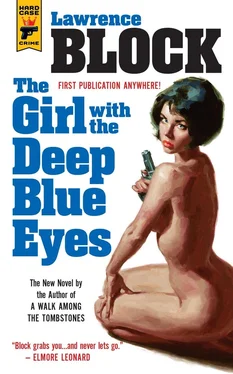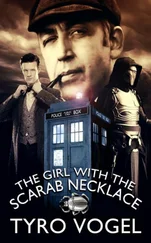But it was he who pushed the button and ended the conversation. And the relationship with it, he thought, and not a moment too soon.
About time he let go of Barb. His life was complicated enough without her in it.
In a Lonely Place , the sound restored, reached its dark ending. He turned off the set and sat in front of it, his eyes on the blank screen.
After a while he called Lisa, caught her just as she was leaving for work.
“Stay on the floor for your whole shift,” he told her. “Be around people. Don’t duck out even for a minute, don’t make any phone calls.”
“On this phone, you mean.”
“On any phone. And we’re done with these phones. We can’t use them anymore, and owning them is dangerous. Do you have any saved messages?”
“Just one. In case I needed to hear your voice.”
And what would happen when someone else heard it? He said, “Well, the first thing you do is delete the message.”
And he told her the rest — how to dismantle the phone, how to get rid of it. He’d be doing the same with his, he said.
But how would they be able to talk?
“We won’t,” he said. “Not for a while.”
After their last visit to the love nest, he’d watched the Lexus drive off, then spent a few minutes buying some things for cash at J. C. Penney’s. Black wash pants, a black hoodie, a pair of black sneakers.
He was wearing his purchases when he left the house. The Baby Browning with its green stone grips was in one pocket. The Taurus revolver, all its chambers loaded, was in another. His own lawfully registered Smith stayed behind on the closet shelf, while the Ruger nine remained out of easy reach in the kitchen cupboard.
Got in his car, sat behind the wheel with the key unturned in the ignition, going over it all in his mind. Knew it was time, knew what he would do and how he would do it. It wasn’t a terribly complicated plan, but the best ones never were.
He had it figured out. He could do it.
He started the car, drove off, turned left at the end of Osprey Drive.
He had a full tank of gas. He had a few hundred dollars in his wallet, a couple of credit cards that were nowhere near maxed out. He could cut east and pick up I-75 and just drive. Be safe to use the credit cards, because nobody would have any reason to be looking for him. Because he hadn’t done anything, and he didn’t have to do anything, did he?
He’d already ditched the Lisa phone. Wished he’d saved a message, wished he could have heard her voice one more time, but he hadn’t, and now he couldn’t because the phone was dismantled and discarded.
Just get on the Interstate and go. Forget everything else, blue eyes included, before it was too late.
But it was already too late, wasn’t it? Really, truly, wasn’t that the final message of all the films he’d been watching? Hadn’t it been too late from the beginning?
On Stapleton Terrace, the neighbors’ minivan was parked at the curb. No little Hyundai stood next to it, no Lincoln Town Car hogged the driveway.
He kept going, turned left at the corner, turned left again.
He’d circled the block on an earlier visit. The houses here on this street were all single-family units, with several sporting For Sale signs. One had looked unoccupied, and he was not surprised to find it dark this evening, with no car in its driveway or at the curb.
He parked in front of it, took his keys but left the car unlocked. He skirted the house, walked through back yards and gardens in his dark pants and hoodie, moving lightly in his sneakers, staying in the shadows as much as he could. Here and there a yard had been fenced to confine a child, but he didn’t have trouble threading his way through the yards to the rear of the duplex.
He walked around the side, noted the continuing absence of the Hyundai and the Lincoln, then returned to try his key on Ashley Hannon’s back door. It fit and turned in the lock, but the door, secured by a separate bolt, wouldn’t budge.
Always something, he thought. And it was his own fault. He’d been in the kitchen before, he’d seen the door, and why hadn’t he seen the bolt and done something about it?
Why? Because he hadn’t thought to look for it. You couldn’t think of everything, could you?
You couldn’t just stand there, either, or you’d miss your chance to be the first one inside.
He looked through the neighbors’ kitchen window, saw through the kitchen to a room where a flat-panel TV was entertaining the whole family.
Good.
He walked around to the front of the house, careful not to make any noise. The screen door stuck, and for a moment he thought it was latched, but how had she managed to leave the house with a door latched in front and another bolted in the back? She was lithe, she was athletic, she could no doubt climb out a window, but why on earth—
No, he discovered, the screen door wasn’t latched. It was just stuck, and a slightly firmer pull drew it open.
His key turned the lock without a sound. He slipped inside, drew the door shut.
And stood still, waiting, listening. Nothing.
He couldn’t hear the neighbors moving around. He knew they had the TV on but couldn’t swear it wasn’t muted, as no sound reached him through the wall. A side-by-side duplex had a great advantage over a more conventional two-family house; you could figure on a barrier of concrete block between the two apartments, enough to insulate each tenant from the sound created by the other.
Not much chance anyone could hear him, not with the windows closed and the air conditioning on.
An hour and a half later he drew the bolt that had kept him from opening the kitchen door. He retraced his steps through the back yards, and he had almost reached his entry point when a dog started barking.
He dropped to the ground, rolled into a patch of deeper shade. The dog kept it up, and a light went on above the back door two houses over. The door opened, and a man stepped out onto his brightly lit back stoop and shined a flashlight this way and that.
Then the flashlight went out, and the man went back inside and turned off the exterior light. Doak could hear him cursing the dog for barking at nothing.
He went to his car, took a couple of minutes to catch his breath, and headed home.
He sat up late, waiting for the phone to ring, waiting for a knock on the door.
Nothing.
He went to bed, couldn’t sleep, got up and put the TV on. Watched without watching. Cracked a beer, drank half of it, poured the rest down the sink.
Went to bed again, a few hours before dawn, and this time he slept.
The phone. Radburn, and for a change the Sheriff had placed the call himself. “You met the man,” he said without preamble. “Saw him more recently than I did. You see this coming?”
He held on to the phone, drew a breath.
“Doak? You there?”
“I’m here,” he said, “but I don’t know what you’re talking about. What man, and see what coming?”
“You just woke up.”
“When the phone rang.”
“So you haven’t heard,” Radburn said.
The neighbor had phoned it in, the husband, up in the middle of the night, letting his wife sleep while he soothed a child with a bad dream.
Sitting in the living room, holding the little girl on his lap, trying to think of a story to tell her, he’d looked out the window and seen the big Lincoln in the driveway.
He’d see the car from time to time, but never much past midnight, and here it was getting on for dawn.
Still, nothing alarming about a car in a driveway, where it had every right to be. But when he’d put his daughter back to bed he was wide awake and felt like a cigarette, and his wife didn’t like him smoking in the house.
Читать дальше












